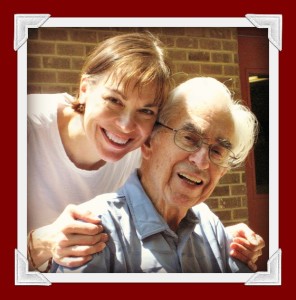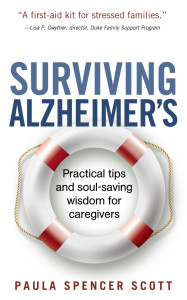An Interview with Paula Spencer Scott – Author of Surviving Alzheimer’s
The Caregiver’s Voice offers a twist to our REVIEW column with this interview with Paula Spencer Scott, author of the new book, Surviving Alzheimer’s: Practical Tips and Soul-saving Wisdom for Caregivers (2014) and a contributing editor of Caring.com.
1. Why did you write this book?
There’s so much more useful information out there about Alzheimer’s than just a decade ago — but it can be hard to wade through, if you’re just starting out and short on time, as so many family caregivers are. Over the past decade, I’ve had the privilege of talking about this subject with countless dementia caregivers, researchers, and experts from all sorts of related fields. Because of my communication background, I’m a good synthesizer, making complicated ideas simple and straightforward. I spent six years doing this as a senior editor at Caring.com, where I helped build its Alzheimer’s channel, a Self-Caring and a news blog, and the Steps and Stages Alzheimer’s resource.
I wanted to put the best advice together in a really accessible way — with the caregiver’s perspective topmost.
This is a labor of love for me. My dad, my maternal grandmother, and not one but two mothers-in-law all had dementia.
A big part of dementia care is understanding WHY people with Alzheimer’s act the way they do — it helps so much. That’s why I present what I call the “why this, try this” approach.
2. Why this approach?
Pausing to think about the “why” gives you a lot that’s valuable. First, you get insight, which leads to more empathy and maybe helps you tap your reservoir of patience. You also get clues to how to respond to challenging or difficult behaviors. And you’re reminded that ultimately” “it’s the disease, not the person.” We all know this, but it can be hard to remember in the heat of the moment.
And you’re reminded that ultimately,
“it’s the disease, not the person.
3. What are three key highlights that will benefit newer caregivers?
Let me “cherry pick” three great ideas gleaned from some of the experts in the book.
Start with an emotional connection.
The wonderful Naomi Feil is the pioneer of an idea called “validation” that’s now widely used. Her work centers on the very old and very demented, but it applies more broadly. It’s about making an emotional connection to validate the person’s emotions and humanity. You can do this by matching your motions and emotions to the other person. Make eye contact, use touch. Ask questions like who, what, where that draw out conversation — don’t argue or try to make logical sense of what’s being said. Show by your interest and attention that you care. That’s so simple, but it’s huge!
Remember that boredom is the enemy.
That’s a quote from David Troxel, co-creator (with Virginia Bell) of the Best Friends Approach to Alzheimer’s therapy. Now, that may sound like extra work for a caregiver, thinking up things to do all day! But really, it’s a reminder that everyone wants to feel involved and engaged — and there are easy ways to do this that improves mood and agreeability, which actually makes life easier for you.
You can’t fight dementia, but you can fight stress.
Alzheimer’s is a progressive condition; your actions aren’t going to stop it from getting worse. But it’s in your power to keep your stress level from worsening. One important way is to get grip on the factors that underlie stress — things like lack of control, isolation, worry, and having unrealistic standards. The book hones in on all kinds of stress-busters.
4. Finally, what do you hope to leave caregivers with after writing this book?
As you can tell, I’m ultimately all about easing stress. People who care for those with brain changes are such unsung heroes — but there’s no good that comes from sacrificing their own health and well-being along the way. Through the many caregiver stories included, anyone reading it will feel less alone. And through the expertise offered, they’ll feel better equipped to prevent or respond to the very common situations that millions of others are going through, too. 
Before entering the world of eldercare, Paula was a columnist for Woman’s Day and Parenting magazines and the co-author of books about health and family with doctors at Harvard, UCLA, Duke, and Arizona State. A Met Life Foundation Journalists in Aging Fellow, she’s presented at Aging in America and on AlzheimersDisease.com.
For more information, click on the book cover above.










